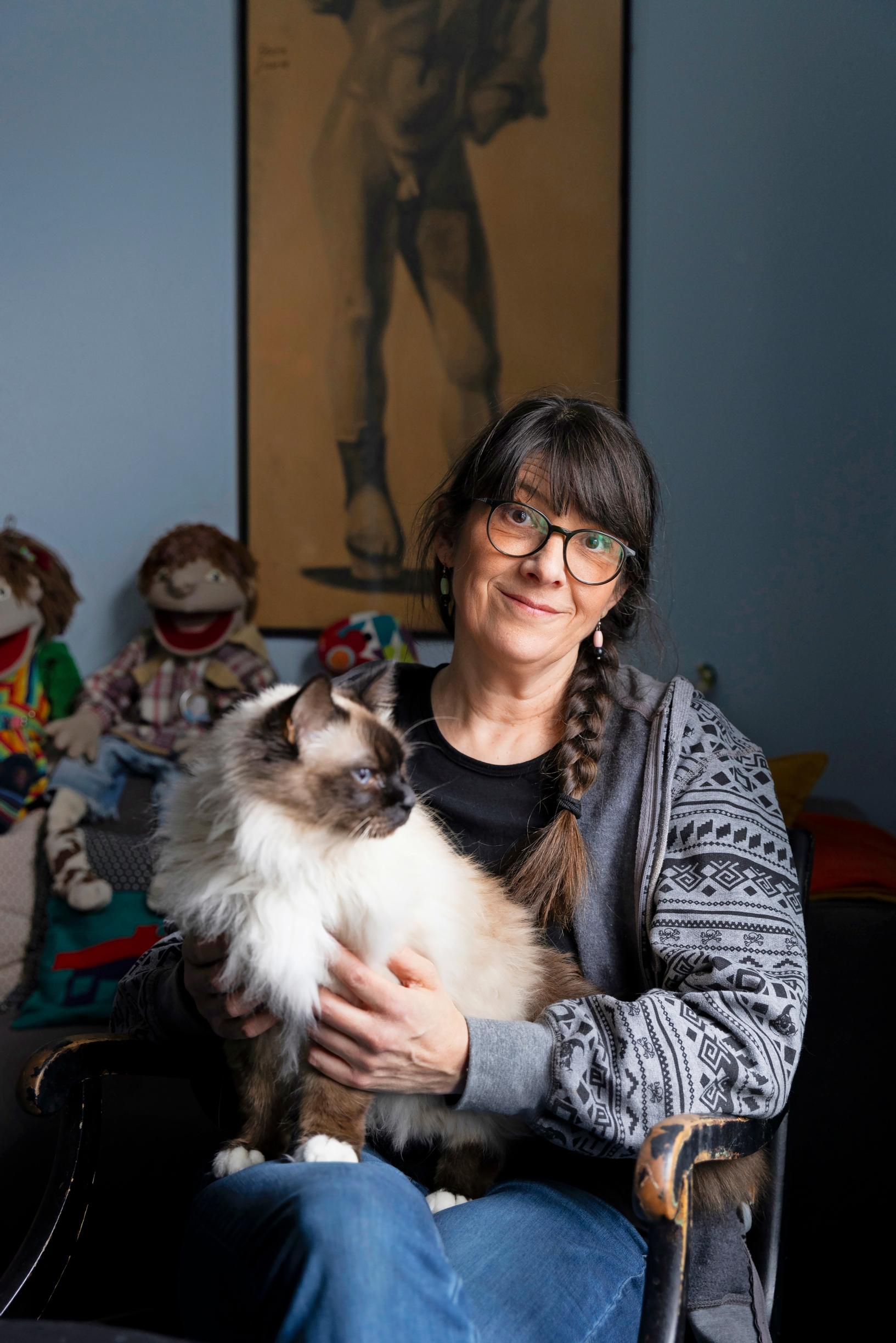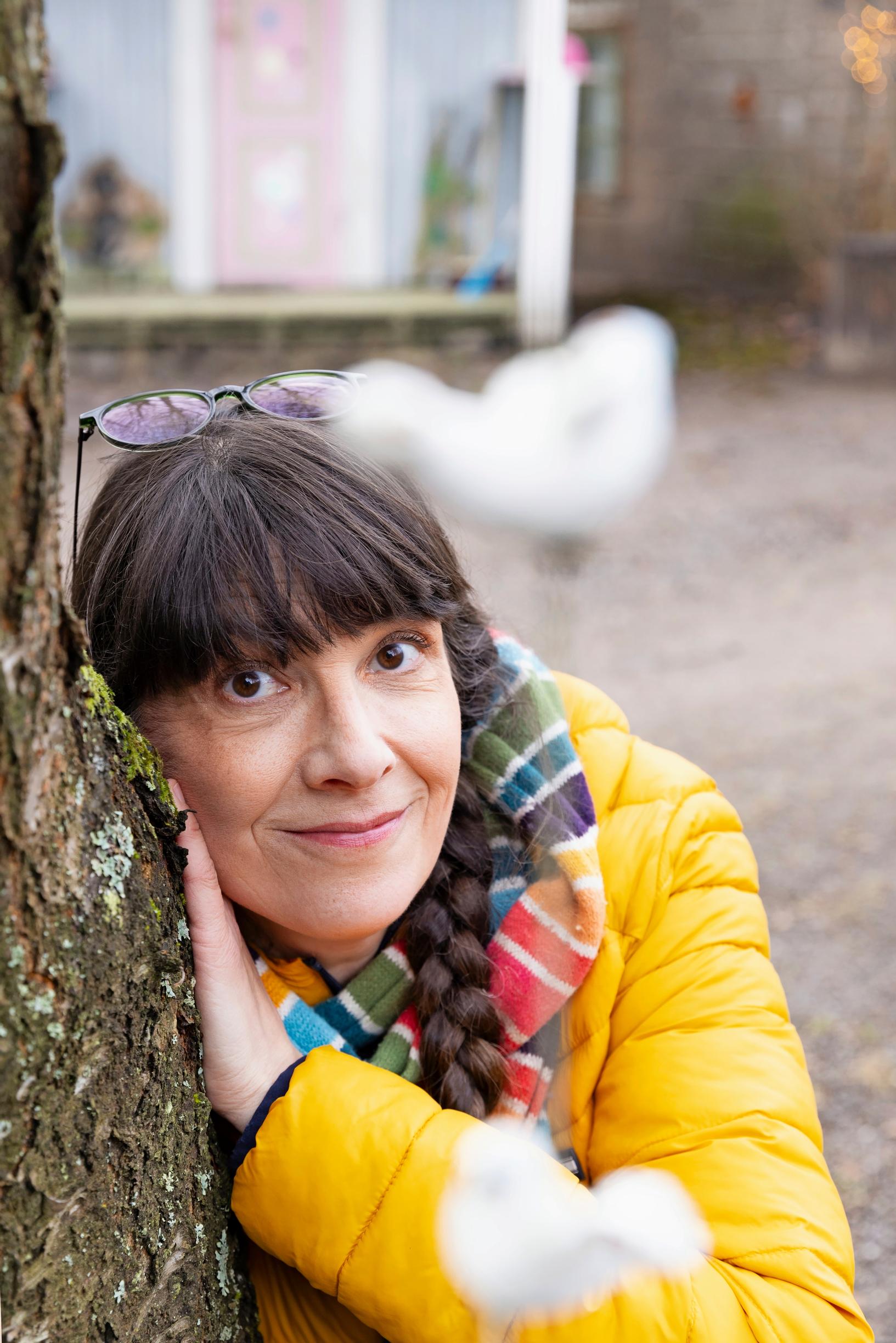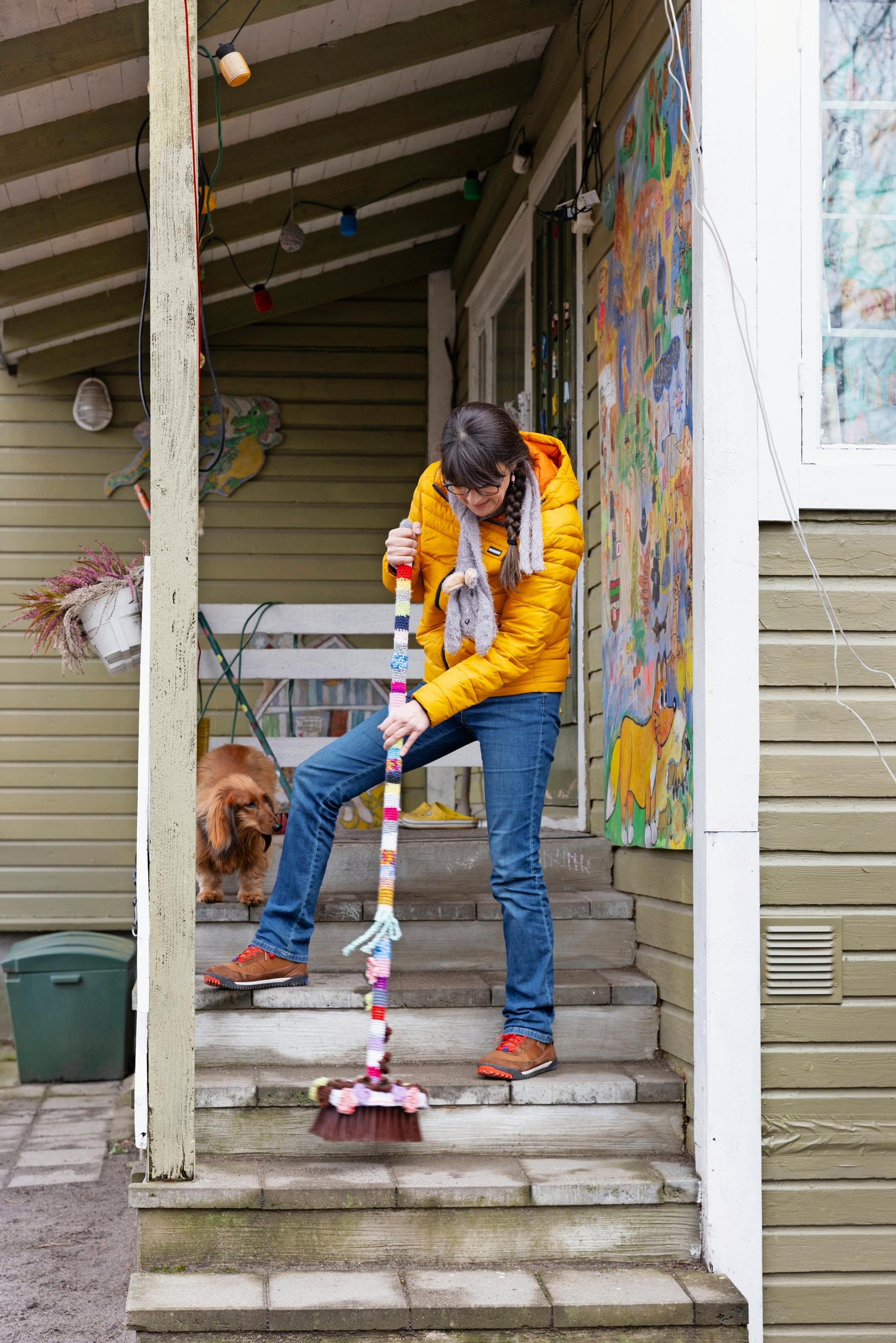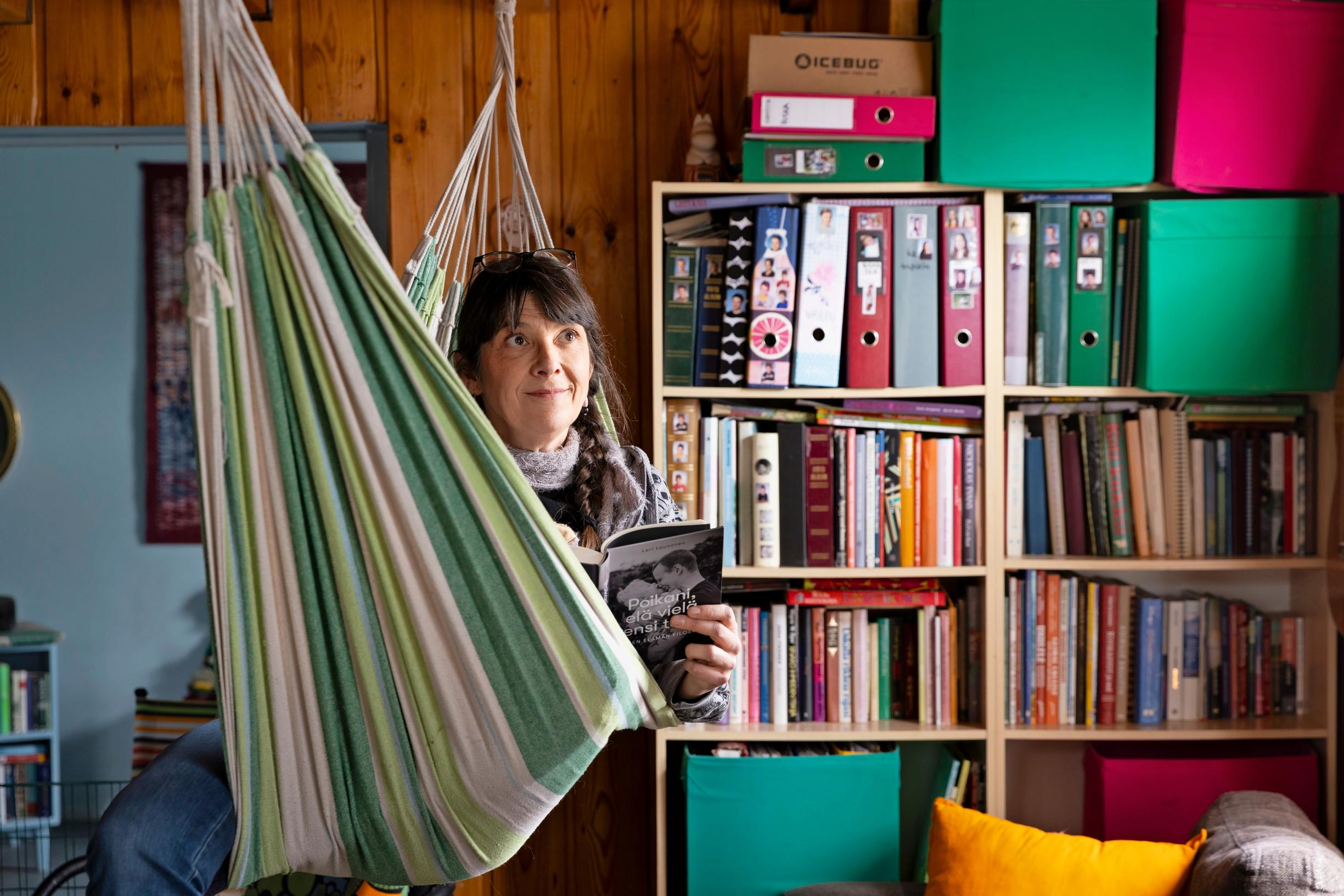
After her grandchild’s diagnosis, Saara thought everything would collapse: “You can learn to live with constant worry”
Fifty-three-year-old Saara Suvitie’s grandchild has the rare 22q11.2 deletion syndrome. After the initial shock of the diagnosis, Saara has drawn strength from information, therapy—and the unique bond she shares with her granddaughter.
Saara Suvitie from Turku, Finland, couldn’t help but laugh. On the car radio, Antti Tuisku was singing the song Tragedia and kept repeating: Oh my god, oh my god.
It was January 2019, around three in the morning. Saara had just jumped behind the wheel after receiving a message from her son that his wife had gone into labor. Grandma was urgently needed to watch the couple’s two daughters, who were two and four years old at the time.
Later that morning, Saara got a text from her son announcing the family’s third child had arrived—a baby girl. He also sent a picture of the new arrival.
It had snowed overnight. The day was briskly cold, the sun shining in a clear blue sky. Saara dressed up the older sisters in their winter wear and pulled them on a sled through downtown Turku to the hospital maternity ward to meet their little sister. Saara thought the baby was sweet and adorable—yet short, tiny, and with facial features unlike her older siblings.
“I had no idea what it was all about. I felt uncertainty and concern creeping up on me, but I didn’t know what to say since no one else brought it up.”
Saara took her son and the girls to the hospital cafeteria. She had coffee and a jelly doughnut, bought her son a sandwich and treated her granddaughters to ice cream as a celebration, even though it was winter and freezing outside.
“At the same time, a nagging worry ate away at me, and I felt like I was shaking inside. I stayed quiet and marveled at how calmly my son and daughter-in-law were handling the situation—that something was off, but nobody knew what.”
“I was afraid to voice my concerns. I wondered if they’d cut me off for bringing it up.”
A few days after the girl’s birth, Saara returned to her job at a daycare center. On her commute, she sent her son a voice message expressing her suspicion that their baby might be ill.
“I was afraid to voice my concerns. I wondered if they’d cut me off for bringing it up. Even so, I wanted to encourage them to look into it and seek help early.”
Saara’s son gently urged Grandma not to worry—they would keep an eye on the situation and go at their own pace. When Saara arrived at work, her colleagues congratulated her and rejoiced over the news. Saara felt like crying.
Saara is a trained practical nurse and has spent nearly 30 years working in childcare. As the months passed, she closely monitored the baby’s development.
“I watched her every moment as if through a magnifying glass. Joy and sorrow mixed with fear and worry.”
The baby stayed awake through the night and didn’t fall asleep until four in the morning. Saara frequently took all three girls to sleep over at her place, so their parents could catch up on rest. At the same time, she lay awake herself, hoping the tests would reveal an explanation.


The children at the daycare were finally settled for their afternoon nap. On duty in the nap room, Saara sat down and checked her phone. That’s when a WhatsApp message from her daughter-in-law arrived: her granddaughter had been diagnosed with the rare 22q11.2 deletion syndrome. Though rare in general, it is one of the most common chromosomal abnormalities.
It was October 2020, and the little one was a year and eight months old. Saara, seated on the nap-room floor, looked up 22q11 Finland and joined the association.
“For a moment, I felt like I was floating. Finally there was an explanation for all the uncertainty and worry.”
Although Saara had previously read about the syndrome, she hadn’t connected it to her granddaughter. Symptoms of 22q11.2 deletion syndrome vary widely from one individual to another.
Distinctive facial features and heart defects, as well as structural anomalies of the heart, are among the most common symptoms.
A cleft palate, an underdeveloped thymus, slower growth and development, and weak muscles are also typical symptoms, as are learning difficulties and delayed speech.
Autism spectrum disorders and mental health problems, especially schizophrenia, are more common among those with the syndrome than in the general population, though they usually don’t emerge until adolescence or adulthood.
All this Saara learned at once in silence while watching over the napping children. She felt compelled to soak up every piece of information about the syndrome. At the same time, the tension and exhaustion lifted.
“Right after my grandchild got the diagnosis, I suddenly hit menopause. My sleep became even more restless, and the hot flashes and sweating started.”
Saara recalled reading that stress could accelerate menopause. She made an appointment with a gynecologist and requested hormone replacement therapy. She needed to be able to sleep and gather her thoughts.
“Already being a grandma made it easier to accept that menopause was on the way. Adjusting felt mentally easy.”
“I felt like everything was crashing down on me and I was paralyzed. As if I had lost all sense of direction in life and couldn’t hold onto anything.”
Two weeks after the diagnosis, Saara’s spirits broke down. She felt like she was collapsing completely.
“I felt like everything was crashing down on me and I was paralyzed. As if I had lost all sense of direction in life and couldn’t hold onto anything.”
Saara grew irritable at the daycare. A coworker wondered why she was snapping so harshly and angrily ordering the little ones to put their heads on their pillows. That’s when Saara burst into tears and asked to see the occupational health psychologist.
The first appointment already made a difference. Saara felt as though she had talked nonstop for the entire hour. After three visits, she was referred to a psychiatrist, and in March 2021, she started psychotherapy, which continued for three years.


In therapy, Saara felt herself calming down as she was free to articulate her thoughts without limits. It helped her organize her thoughts and better understand the family’s situation. The worry that had lasted for months was real, and now a permanent part of their life.
What helped even more, Saara feels, were peer support and participation in association activities. Right after joining the association, she was paired with a peer support person who had a child with the same syndrome—and, to top it off, they turned out to live in the same neighborhood.
“In that new situation, I was surrounded from the beginning by people who knew firsthand what it was about.”
Saara realized that when she was with others in the same situation, she didn’t need to justify her thoughts. She could be “wide open” and contemplate questions that had no immediate answers.
“Though talking doesn’t change the reality, it’s still empowering to be seen, heard, and understood. You get to share the reality you’re living.”
Today, Saara is the vice chair of the association’s board and coordinator of peer support. She has completed training in peer support and expertise by experience.
“It was important for me to feel like I was on top of this situation. I managed that through the support of those who’ve dealt with the same thing, as well as by soaking up masses of information about the syndrome.”


Swinging in the hammocks that hang from the ceiling at Grandma’s. Watching a movie together, eating popcorn and “black candies.” Summer nights of goofing around on the trampoline. Stone painting and arts and crafts. Trips to the swimming hall and to the movies. Wild dance parties when everyone should already be asleep.
Saara has a close relationship with her six-year-old granddaughter. She and her sisters stay over at Grandma’s for one night every weekend. If Saara has commitments on a weekend, she lets her son and daughter-in-law know in advance so they can schedule the girls’ weekly sleepover for a different day.
“One of the most important ways I’ve supported my son’s family has been by encouraging the parents to spend time just the two of them. I make that possible by taking the girls whenever they ask.”
Saara has four children with three different partners. Her own breakups have been painful, and she knows how essential it is for a couple to recharge on their own every once in a while to keep the intimacy alive and the energy reserves stocked for everyday life.
Saara’s daughter-in-law is her daughter’s primary family caregiver, and Saara serves as her substitute.
“I’m grateful to have been able to be so closely involved in my son’s family’s life and in all of this.”
Saara’s granddaughter attends daycare for about three hours a day and receives speech and occupational therapy. She has grown to an age-appropriate size with the help of nutritional supplements. The structural heart defect caused by the syndrome was repaired through surgery in December 2023. Last summer, she learned to ride a bike without training wheels, and in the fall she learned to swim.
“She’s wonderful, magnificent, and perfect just as she is. On top of everything else, she has a terrific sense of humor and she’s really fun to be around.”
Saara laughed especially hard recently when the girl’s older sisters wondered why she kept babbling about bathroom topics. The girl firmly replied that she just wanted to hear Grandma laugh.
“She seems to have great self-esteem. That gives me reassurance.”
Could I go to my grandchild’s school with her, Saara found herself wondering recently. As the girl gets closer to school age, the fear of bullying has weighed on Saara’s mind.
“I’ve considered even those kinds of absurd ideas, and then realized that maybe my grandchild wouldn’t want her grandma as a classroom aide,” Saara says.
You have to be able to let go of anxious thoughts, she knows that. It’s best to trust that everything will turn out alright.
“Time helps. You can learn to live with constant worry,” Saara reflects.
“She seems to have great self-esteem. That gives me reassurance.”
Being the grandparent of a child with a rare illness has taught Saara to accept her own imperfections too. She says she admires the calm, gentle Moominmamma, but sees herself more like Little My: extremely talkative and impulsive with a quick temper—but also cheerful and full of laughter.
“My son has wondered why I admire something I am not. Instead, he’s encouraged me to focus on my strengths. So I’ve decided to proudly be a silly and easygoing grandma.”
“Though talking doesn’t change the reality, it’s still empowering to be seen, heard, and understood.”
Association work is important to Saara, because she wants to bring visibility to the syndrome.
“22q11 is the second most common chromosomal disorder right after Down syndrome, and about a hundred children are born with it in a year. Yet so little is known about it. So many children could get help sooner if we were better able to recognize it early,” she contemplates.
Spreading information has helped Saara accept her granddaughter’s illness.
“Because of that, I’ve been able to give my grandchild’s condition some meaning, a sort of explanation as to why things happened this way. I think that’s valuable.”
She also volunteers once a month in a support group for parents of adults dealing with mental health issues.
“Among those with the syndrome, about 25 percent develop schizophrenia. I’ve wanted to confront the things that scare me head-on.”
By doing so, she has learned to approach the future with a more restful mind.
“They often say ignorance is bliss. But with rare illnesses, ignorance causes grief and knowledge brings security. When you’re informed, you feel that you can influence things and prepare for what’s ahead.”
That’s when Saara feels that life does go on.


